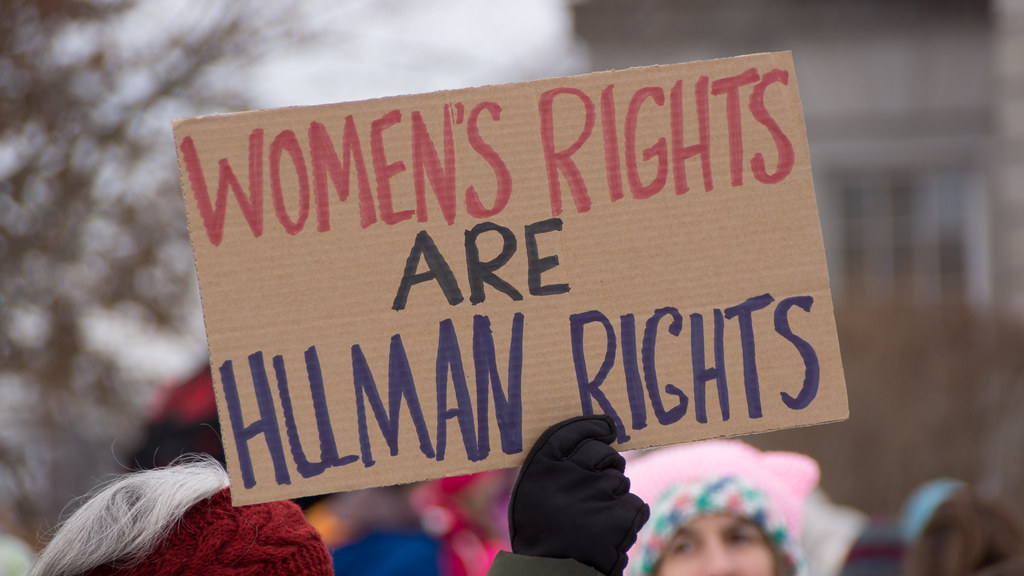Throughout the history of the world, respecting the rights of all human beings has been an issue. Following the end of World War II, a document was put into place which was intended to aid this issue, which was the Universal Declaration of Human Rights. This document was formulated by the United Nations, and has been signed by 192 countries to date. By signing this document, these countries have vowed to respect all of the principles within it, which include equal and total protection of the rights of all of their citizens. However, this is not the case for all of the countries that have signed. One of the groups facing the consequences of this is women. Women’s rights are not fully respected across the world, two examples of this are Egypt and America.
One of the most controversial topics at present is abortion. Beginning in the 1970s in America, abortion was protected under the ruling of Roe v. Wade. However, in June of 2022, this ruling was overturned, beginning the transformation of many state laws. Virtually immediately following the overturning, states passed bans on abortion. While many of these laws are not complete bans, they make it challenging to receive one. Bans do reduce the number of legal abortions, but they do not stop them from occurring. Solutions to the lack of accessibility include crossing state borders, or searching for illegal options. If a woman is forced to carry out the pregnancy and give birth, research shows that she is more at risk for physical and mental health complications (Pratasava). Women who keep unwanted pregnancies are at a higher risk for various forms of maternal depression, and this can cause physical symptoms. Maternal depression is one of the biggest issues facing mothers, and the expected rise in cases caused by the abortion ban makes it even more severe.
Another issue within America inflicting upon the rights of women is gender based violence. The most prevalent examples of violence are sexual assault and harassment, and domestic violence. Women are disproportionately more likely to experience sexual assault, and more specifically rape, compared to men. For every 10 people raped in America, 9 are women (“Scope of the Problem; Statistics”). This statistic makes the already alarming issue that much more astonishing. This is arguably one of the worst instances of violations of women’s rights in America.
Domestic violence against women is another example of violence towards women. Per year, there is an average of 4.8 million instances of women being harmed by an intimate partner (“Violence Against Women in the United States; Statistics”). Additionally, many women do not seek help after experiencing physical or emotional harm. They instead suffer in silence, without a safe place to go. Without programs in place to prevent this from happening, there is no way to limit the injuries of women. This epidemic infiltrates the homes of women, and prevents them from having positive outlooks on relationships.
Another nation which does not currently fully protect the rights of women is Egypt. In Egypt, one of the biggest limitations that women face is the Personal Status Law, or Family Law. This law regards marriage and divorce, as well as other aspects of personal lives. This law has many more restrictions for women compared to men, in regions such as marriage and divorce. As for marriage, muslim women are prevented from marrying men from another faith, however muslim men do not have these same rules (“Family law in Egypt”). This is a blatant example of gender discrimination in Egyptian law.
Another issue within this law is divorce. Divorce is highly common in Egypt, but the restrictions on filing for divorce for women are very strict. There are two types of divorce in Egypt, fault and no-fault divorce. Fault divorce is a filing in which the woman must prove that it is harmful for her to live with her husband anymore. There are many reasons that this could be, but they all must be proven with either physical evidence or several witnesses. These cases do not have financial consequences for the woman if she is the one filing the divorce, however they are very challenging to complete, as many cases do not make it through the grueling process (“Overview of Marriage and Divorce Laws in Egypt”). Fault divorces are less common than no-fault divorces, as Egyptian law makes it very challenging for parties to prove their reasoning. The lack of ability to seek this kind of divorce for women is a violation of their rights, limiting their control over their marriage situation, and life as a whole.
The other type of divorce is no-fault divorce. This type of divorce makes it so that women and men are able to file for divorce, even when they are still able to live with one another. While this may sound positive, there are many conditions that come with this form of divorce for women if they are the ones to file. Most of these conditions are financial. If a dowry is paid at the beginning of the marriage, the woman must agree to repay it, even if it was already used. Additionally, she must agree to go without alimony (“Overview of Marriage and Divorce Laws in Egypt”). While it is beneficial that this kind of divorce allows for separation before injuries or harm occurs to the woman, it does not make it entirely accessible. The process is easier, however the financial conditions that women must follow make life post-divorce challenging.
Women are also facing domestic violence and sexual assault in Egypt. In a study done in 2018 of women ages 15-49, 15.8% reported being victim of physical or sexual assault by an intimate partner within the year (Rabinowitz). This statistic clearly demonstrates the harm being imposed upon women, violating their human rights. Additionally, the numbers are not decreasing, but rather increasing at alarming rates. Between 2020 and 2021, the amount of domestic violence cases filed by women nearly doubled (Rabinowitz). This huge rise illustrates the severity of the issue in Egypt, and shows how action needs to be taken immediately.
Abortion within Egypt is a highly complicated issue. Within its Penal Code, Egypt bans abortion entirely, however it can be done in times of “necessity” (Atighetchi 126). This code does not explicitly state what this means, so it can only be inferred that saving the life of the mother is a “necessity.” However, this decision is left up to the court, and safe abortion to save mothers’ lives is not guaranteed. Additionally, mothers cannot opt to have an abortion in the event of rape or incest (“Egypt: Egyptian Initiative for Personal Rights and RESURJ”).
Between these two nations, many similarities can be seen, even though they appear very different at surface level. Both are regressing in the safety of women, and falling short in the protection of their rights. To combat this, it must be accepted that violations of the rights of women are frequently overlooked. They are within societies across the globe, minor and major. Regardless of the violation, they must all be treated with the same urgentness. Violations of women’s rights are violations of human rights, and they must be addressed.
Works Cited
Atighetchi, Dariush. Islamic Bioethics: Problems and Perspectives. Springer Science and Business Material, 2006. Google, https://books.google.com/books?id=Tdm9V89lW3IC&pg=PA126#v=onepage&q&f=false. Accessed 24 January 2024.
“Egypt: Divorced from Justice: III. Overview of Marriage and Divorce Laws in Egypt.” Human Rights Watch, December 2004, https://www.hrw.org/reports/2004/egypt1204/3.htm. Accessed 24 January 2024.
“Egypt: Egyptian Initiative for Personal Rights and RESURJ.” International Campaign for Women’s Right to Safe Abortion, 2023, https://www.safeabortionwomensright.org/isad/egypt-egyptian-initiative-for-personal-rights-and-resurj/. Accessed 24 January 2024.
“Home Family law in Egypt.” GOV.UK, 18 April 2023, https://www.gov.uk/government/publications/family-law-in-egypt/family-law-in-egypt. Accessed 24 January 2024.
Pratasava, Valeryia. “Unwanted Pregnancies: Outcomes for Children: Women’s Health Education Program Blog – College of Medicine.” Drexel University, 18 February 2022, https://drexel.edu/medicine/academics/womens-health-and-leadership/womens-health-education-program/whep-blog/unwanted-pregnancies-outcomes-for-children/. Accessed 24 January 2024.
Rabinowitz, Ainav. “The Renewed Fight to Prevent Domestic Violence in Egypt.” Wilson Center, 26 January 2023, https://www.wilsoncenter.org/article/renewed-fight-prevent-domestic-violence-egypt. Accessed 24 January 2024.
“Scope of the Problem: Statistics.” RAINN, www.rainn.org/statistics/scope-problem. Accessed 1 Feb. 2024.
“Violence against Women in the United States: Statistics – National Organization for Women.” National Organization for Women –, 30 Apr. 2018, now.org/resource/violence-against-women-in-the-united-states-statistic/.


